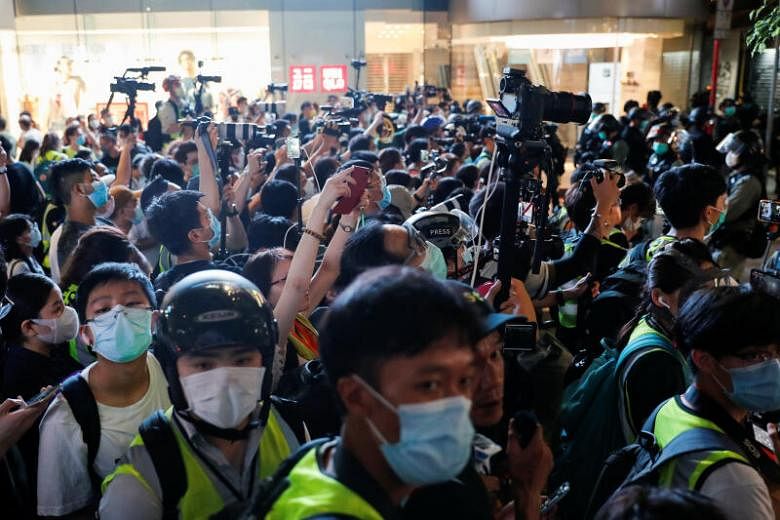HONG KONG (BLOOMBERG, AFP) - China repeated that it would take measures if Washington didn't renew visas for Chinese journalists working in the US, amid questions over whether it will make a tit-for-tat move against American reporters in Hong Kong.
"We learned that relevant Chinese journalists applied for visa extensions but none of them have received a clear reply from the US side," Chinese Foreign Ministry spokesman Wang Wenbin told a daily briefing in Beijing on Thursday (Aug 6), echoing comments he made earlier this week.
"If the US is bent on going down the wrong path, China will take necessary and legitimate measures to defend its interests."
Speculation over the future visa status of US journalists working in Hong Kong mounted this week following online posts by Global Times editor-in-chief Hu Xijin that a number of Chinese journalists would see their visas expire on Aug 6, and "none of them" had yet been renewed.
"From what I know, given that the US side hasn't renewed visa of Chinese journalists, Chinese side has prepared for the worst scenario that all Chinese journalists have to leave the US," Mr Hu wrote Tuesday on Twitter. "If that's the case, Chinese side will retaliate, including targeting US journalists based in HK."
Hong Kong's foreign press club said on Thursday (Aug 6) that reporters in the territory were experiencing "highly unusual" visa problems, and called on China and the United States to stop using the media as a political weapon.
Journalists have been caught up in spiralling US-China tensions, with both sides placing limits or expelling reporters from their territories in recent months.
Now the spat is filtering into Hong Kong, a semi-autonomous city and regional press hub nominally in charge of its own immigration policies.
In a statement released on Thursday, the Foreign Correspondents' Club of Hong Kong said multiple media outlets had reported delays getting visas in recent months.
"The delays have affected journalists of multiple nationalities and in some cases have prevented journalists from working," the Club said.
"The delays are highly unusual for Hong Kong, a city with historically robust press protections," it added.
Hong Kong's government has not explained any change to its policy despite multiple inquiries from media.
On the Chinese mainland, where the press is heavily censored, foreign journalists must apply for specific visas, and face routine harassment.
Reporters only need a regular business visa to work in Hong Kong, however.
China promised key liberties and autonomy to Hong Kong ahead of Britain's handover, and the city has free press protections enshrined in law, something that has helped it become a regional media hub.
The New York Times, AFP, CNN, the Wall Street Journal, Bloomberg and the Financial Times are among multiple media organisations with regional headquarters there.
But multiple news outlets are now reporting issues getting or renewing visas for staff - something they have not experienced before.
Last month, the New York Times was the first to go public with its difficulties, announcing that it would relocate some of its Asia hub to South Korea after multiple delays and at least one outright rejection.
The difficulties come as Washington and Beijing clash over reporter credentials.
The Trump administration placed visa and headcount restrictions on some Chinese media in the US, all of which are state-controlled.
Beijing responded with tit-for-tat restrictions, including expelling a group of reporters from multiple US outlets who were also banned from working in Hong Kong, an unprecedented move.
On Tuesday, Beijing's foreign ministry warned that "necessary and timely countermeasures" would be taken if the US continued to limit Chinese reporters.
The Foreign Correspondents' Club of Hong Kong condemned the restrictions placed by both sides.
"The FCC opposes using journalists' visas as a weapon in international disputes and also opposes taking action against journalists for the decisions made by their home countries," it said.
"This downward spiral of retaliatory actions aimed at journalists helps no one, not least of all the public that needs accurate, professionally produced information now more than ever," it added.

